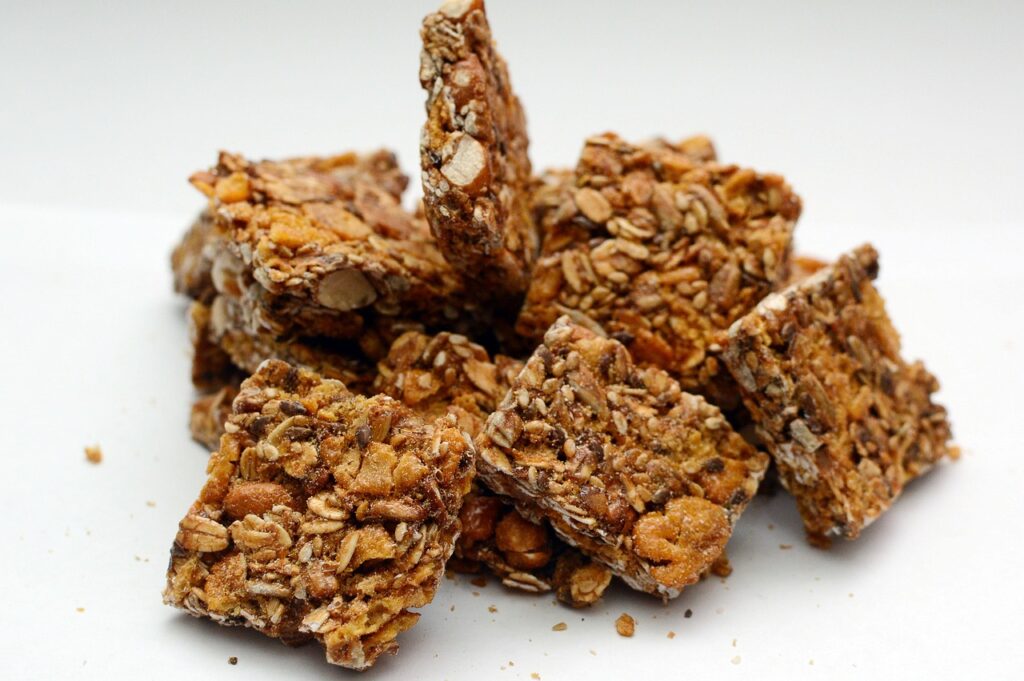Top Benefits of Eating Granola: Why It Deserves a Place in Your Daily Diet

Discover the powerful health benefits of granola and why it should be your go-to choice for a nutritious breakfast or a wholesome snack.
Granola has become a household name in the world of healthy eating, and for good reason. This crunchy blend of rolled oats, nuts, seeds, dried fruits, and natural sweeteners like honey or maple syrup packs a nutritional punch that few other snacks or breakfast options can rival. Whether enjoyed with yogurt, milk, smoothie bowls, or straight from the bag, granola offers an unbeatable combination of taste and health benefits.
In this article, we explore the top benefits of eating granola, supported by scientific research and nutrition facts. Whether you’re trying to manage your weight, support your digestive health, or simply eat clean, this guide will help you understand why granola should be a part of your daily diet.
1. Rich in Dietary Fiber for Better Digestion
One of the standout benefits of granola is its high fiber content, particularly when made with whole grain oats, seeds, and dried fruits.
Why fiber matters:
Promotes regular bowel movements
Prevents constipation
Aids in detoxification of the body
Helps maintain a healthy gut microbiome
The soluble fiber found in oats forms a gel-like substance in the gut, slowing digestion and promoting the growth of healthy gut bacteria. Insoluble fiber, on the other hand, adds bulk to stool and helps move waste through your digestive tract.
2. Supports Weight Management and Satiety
Granola can be a powerful ally in managing your weight—when eaten in moderation and as part of a balanced diet.
How granola helps with weight control:
High in fiber and healthy fats, which keep you full longer
Slows blood sugar spikes, preventing energy crashes and cravings
Encourages mindful eating due to its chewy, satisfying texture
Instead of reaching for processed snacks, a small serving of granola (about 1/4 to 1/2 cup) can keep hunger at bay and curb overeating throughout the day.
3. Provides a Plant-Based Source of Protein
Protein is essential for muscle repair, hormone production, and immune function. While granola isn’t a complete protein, it often includes ingredients like nuts, seeds, and nut butters that contribute valuable plant-based protein to your diet.
Popular protein-rich granola ingredients:
Almonds
Pumpkin seeds (pepitas)
Sunflower seeds
Chia seeds
Peanut butter or almond butter
Adding granola to Greek yogurt, a protein smoothie, or plant-based milk further boosts the protein content of your meal.
4. Packed with Antioxidants and Micronutrients
Granola is more than just oats—its wide variety of ingredients deliver a potent dose of antioxidants and essential vitamins and minerals.
Key nutrients commonly found in granola:
Vitamin E: From seeds and nuts, promotes skin health and acts as an antioxidant
Iron: Supports oxygen transport and prevents anemia
Magnesium: Important for muscle and nerve function
Zinc: Boosts immunity and wound healing
B vitamins: Help convert food into energy
Dried fruits like cranberries, raisins, and goji berries contribute polyphenols and natural sweetness without refined sugars.
5. Boosts Energy and Stamina
If you’re looking for a quick and healthy energy boost, granola is a smart choice. The complex carbohydrates in oats break down slowly, providing sustained energy rather than a sugar crash.
This makes granola perfect for:
Pre-workout snacks
Hiking and outdoor activities
Midday energy slumps at work
Combined with protein and healthy fats, granola helps stabilize blood sugar levels and keeps energy levels consistent.
6. Helps Maintain Healthy Cholesterol Levels
Several studies suggest that the beta-glucan fiber in oats, a primary component of granola, plays a role in lowering LDL (bad) cholesterol levels.
How granola benefits your heart:
Reduces total cholesterol
Increases HDL (good) cholesterol
Contains omega-3 fatty acids from flaxseeds and chia seeds
Offers anti-inflammatory compounds from nuts and seeds
A heart-healthy granola blend can contribute to overall cardiovascular wellness when paired with a balanced diet and exercise.
7. Naturally Gluten-Free Options Available
For those with celiac disease or gluten sensitivity, there are many gluten-free granola options made with certified oats, seeds, coconut, and dried fruits. These varieties allow people with dietary restrictions to enjoy the benefits of granola without compromising their health.
8. Supports Blood Sugar Control
While some granolas are high in added sugars, homemade or low-sugar granolas with minimal processing can actually help support blood sugar control.
Why?
High-fiber ingredients slow down glucose absorption
Healthy fats and proteins reduce insulin spikes
Naturally sweetened options avoid refined sugars
Choose granolas that use natural sweeteners like dates, maple syrup, or monk fruit in moderate quantities.
9. A Versatile and Convenient Food Option
Granola is easy to prepare, store, and carry, making it one of the most versatile pantry staples for health-conscious eaters.
Ways to enjoy granola:
With yogurt or plant-based milk
As a topping for smoothie bowls
In homemade granola bars or cookies
Sprinkled on baked fruits or salads
Whether you’re on the go or at home, granola is a grab-and-go food that doesn’t compromise on nutrition.
10. Can Be Tailored to Any Dietary Preference
One of the best things about granola is that it can be customized to fit nearly any dietary lifestyle—whether you’re vegan, keto, paleo, or dairy-free.
Customizable features:
Add nuts for extra fat and protein
Use dried fruit for natural sweetness
Go grain-free by using coconut flakes and seeds
Add spices like cinnamon or turmeric for added benefits
Homemade granola gives you full control over the ingredients, flavors, and nutritional content.
FAQs About the Benefits of Eating Granola
Yes, granola can help with weight loss when consumed in moderation. Its high fiber and healthy fat content promote fullness and reduce snacking.
Yes, diabetics can enjoy low-sugar granola options made with whole grains, nuts, and seeds. Always check the label for added sugars.
A typical serving is 1/4 to 1/2 cup. Overeating can add excess calories, so portion control is key.
Granola is ideal for breakfast, pre/post-workout, or as a midday snack. It can be eaten any time you need a nutritional boost.
It depends. Many commercial granolas contain added sugars and preservatives. Look for clean-label or homemade granola with minimal ingredients.
Conclusion: Make Granola a Staple in Your Healthy Diet
Granola is more than just a trendy breakfast item—it’s a nutrient-rich, energy-boosting, and delicious addition to any meal plan. Whether you’re looking to improve digestion, support heart health, or find a convenient on-the-go snack, granola has something to offer.
To maximize the benefits, always choose granola with natural ingredients, minimal added sugars, and plenty of whole foods like oats, seeds, and nuts. Even better, make your own at home to customize the flavor and nutrition to suit your lifestyle.
So next time you’re planning your meals, don’t forget to sprinkle a little granola on top—you’ll be adding both crunch and health to your day!
